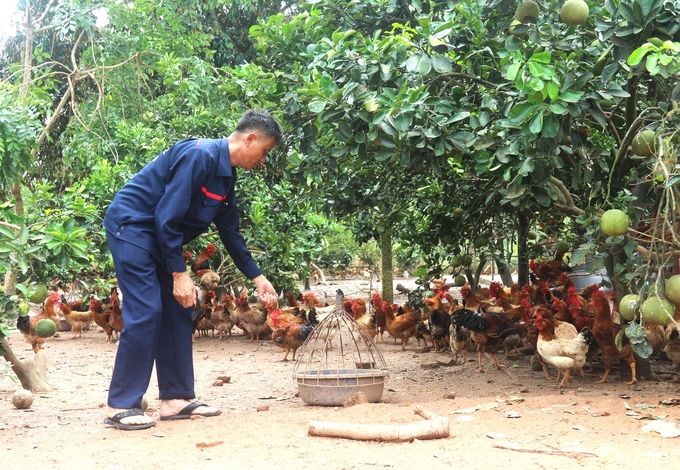May 24, 2025 | 03:39 GMT +7
May 24, 2025 | 03:39 GMT +7
Hotline: 0913.378.918
May 24, 2025 | 03:39 GMT +7
Hotline: 0913.378.918

Phu Binh District (Thai Nguyen Province) is rapidly expanding its local livestock production models that focus on biosecurity. Photo: Pham Trung.
As one of the regions with the largest livestock population in Thai Nguyen Province, Phu Binh District has adopted livestock production practices that focus on biosecurity on a large scale to protect both public health and animal welfare.
The district has utilized provincial support for disease prevention measures and local funding for vaccination programs. Furthermore, it organized training sessions on advanced farming techniques and procedures in addition to developing VietGAP-compliant livestock production models that focus on biosecurity.
At present, out of over 160 farms and family-run operations in the district, 70% are engaged in biosecure livestock production. Notably, ten facilities have been awarded the Disease-Free Livestock Certification, and 18 have met VietGAP standards.
With the aim of further promoting Phu Binh's strengths in livestock production, the district will receive annual support from Thai Nguyen province, with a budget allocation of 3 to 4 billion VND for vaccination campaigns against avian flu, pasteurellosis, swine fever, foot-and-mouth disease, and porcine reproductive and respiratory syndrome in poultry and pigs.
On the other hand, Phu Binh District plans to continue developing disease-free livestock production models and coordinating closely with local communes and towns to provide local residents with instructions on the correct disinfection process for their barns. The district will also monitor the development of disease outbreaks to promptly detect and prevent the emergence and spread of pathogens within the region.
Translated by Nguyen Hai Long

(VAN) The People's Committee of Tra Vinh province has approved an adjustment to the investment policy for the Green Hydrogen Plant project, increasing its area to approximately 52.76 hectares.
![Reducing emissions from rice fields: [2] Farmers’ commitment to the soil](https://t.ex-cdn.com/nongnghiepmoitruong.vn/608w/files/news/2025/05/05/dsc08881jpg-nongnghiep-140632.jpg)
(VAN) Clean rice cultivation model in Thuong Tan commune, Bac Tan Uyen district, is assisting local residents in achieving sustainable agriculture by substantially reducing costs, increasing productivity, and protecting the environment.

(VAN) At the conference to disseminate Resolution No. 68, AgriS introduced its digital agricultural ecosystem and reaffirmed its commitment to accompanying the Government in promoting private sector development and sustainable agriculture.

(VAN) 'Blue Ocean - Blue Foods' initiative is designed to restore marine ecosystems and establish sustainable livelihoods for local communities by cultivating a minimum of 1,000 hectares of cottonii seaweed in the first three years.
/2025/05/21/4642-3-112707_603.jpg)
(VAN) The V-SCOPE project has made direct contributions to three out of six pillars of the Comprehensive Strategic Partnership between Vietnam and Australia.

(VAN) Facing the threat of rabies spreading to the community, Gia Lai province urgently carries out measures to vaccinate dogs and cats on a large scale.

(VAN) Disease-free livestock farming not only protects livestock herds but also stabilizes production and livelihoods for many farmers in Tuyen Quang.